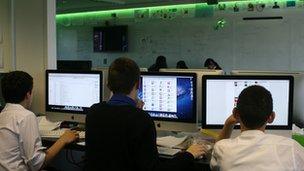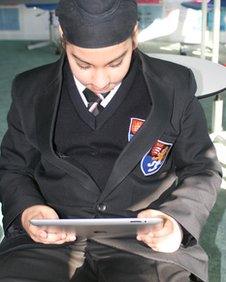School Report 2012: Do kids want to code in class?
- Published
Technology is central to most young people's lives, but there is a disconnect between how they use it at home and how they are taught it.
It is a point not lost on Education Secretary Michael Gove, who wants to radically overhaul the ICT curriculum by next September.
He wants to do two quite opposite things: modernise and go back to basics.
The retro approach would see pupils return to the "beneath the bonnet" lessons of the 1980s when schoolchildren had little choice but to learn to code because computers were altogether less intuitive.
As part ofBBC News' School Report project, pupils at the thoroughly modern Lampton School in Hounslow have been investigating what children think about the current curriculum and plans to change it.
In a survey of 100 pupils, the school reporters found mixed feelings about the changes. Thirty-five percent disagreed with Mr Gove's view of ICT as "dull", while 28% thought it was a good idea to make changes. The rest were undecided.
In part it is down to the fact that Lampton has embraced ICT. While nationally only about a third of ICT teachers are trained specialists, at Lampton all four are.
As a result they have been teaching programming in the classroom for a while.
"We changed the curriculum a long time ago to make it more interesting. It depends on the school and how much presence they give to the subject," said David Lawley, an ICT teacher at the school.
Use of Game Maker software in class has already inspired Year 8 coding wizard Will to create his own game at home. For him the idea of doing more is highly appealing.
"Coding is a great way of learning. When you've done something good like a game you get to take it home and play on it," he told the School Reporters.
But for others the most basic skills are more than enough.
"You don't need more unless you want to do ICT in your career. People are already addicted to computer games without having to make their own," said Year 8 pupil Hira.
David Carpenter is an ICT teacher at Chiselhurst and Sidcup Grammar School. He thinks there are always way to make potentially dull topics interesting.
"We do a module based around superheroes. the kids have to work out which supervillain destroyed the database. They love it and don't even realise that they are learning about databases," he said.

At Lampton it isn't just the curriculum that has been overhauled, as pupils work in a futuristic classroom
Digital leaders
Mr Gove was unavailable for interview but Schools Minister Nick Gibb sent the children a statement.
"It is important that the ICT curriculum taught in schools is inspirational and challenging," he said.
"It needs to equip young people with a real understanding of how computers work and the programming expertise that underpins the software.
"We want young people to be leaving school with the ability to create their own apps and to help our world-leading computer software industry to maintain that lead."
He did not address the question of how the government would make up for the shortfall in specialist teachers.
But the George Spencer Academy in Nottingham may hint at part of the solution. Teachers there have acknowledged that often it is the children who are the experts.
A group of so-called digital leaders, aged 11-16, are running workshops for teachers on how to use programs such as Prezi, cloud-based presentation software similar to Powerpoint.
"They are using technology all the time and are up to date with technology that we haven't used yet," said English teacher Hayley Randall.
"They can offer us innovative ideas to make our lessons more interesting."
Piece of Pi?

Can schools keep pace with new generation of super-users?
Many think there is a sea-change occurring in education at the moment.
The Raspberry Pi mini-computer is designed to encourage children to take up programming, and has captured the imagination of many technology enthusiasts.
With its £22 ($35) price-tag it is affordable even on pocket-money budgets.
The machine is supplied without monitor, keyboard or mouse and runs a freely available operating system and a "start-up" educational coding tool. Children are expected to cut their coding teeth largely through creating their own games and other functions on the cheap machine.
IT entrepreneur James Parsons says strong demand for the device suggests that young people are "hungry" to code. But he says other radical changes are needed.
"Currently the ICT taught in schools is more to do with how to use programmes rather than how to create them," he said.
"The web has democratised business opportunities: if you can code and understand programming, you give yourself a huge advantage"
Young experts

Toddlers are often the family iPad experts
It was a point that Google chief executive Eric Schmidt appeared to endorse on a trip to the UK last year.
He told his audience that the country's failure to teach software development meant it was "throwing away your great computer heritage".
Prof Steve Furber, designer of the BBC Micro, is very much part of that heritage.
The Micro was the cornerstone of technology in schools during the 1980s.
As part of their investigation, the Lampton school reporters interviewed Prof Furber via Skype and asked him how he would change the curriculum.
"Digital literacy - using programs such as Excel, Word and Powerpoint - everyone needs to be able to do that, but they also need to realise that there are far more creative things than using a program someone has written for you," he told them.
"These days it is important to have a good idea about how computers work, whatever skills you go on to pursue."
In a report for the Royal Society,, externalProf Furber called for ICT to be scrapped entirely, and replaced with a compulsory digital literacy module and optional courses in computer science and more business-focused IT.
But how, the School Reporters asked him, would it be taught when only a third of current ICT teachers were actually specialists?
"What we would hope is that when schools are identifying teachers, they look for those with the right specialist qualifications," said Prof Furber.
Technology is getting more and more user-friendly. Children are now commonly referred to as "digital natives" because they have grown up with gadgets their parents could only dream of.
The question going forward will be whether teachers and the school curriculum can keep pace with this new generation of super-users.
- Published29 February 2012
- Published29 February 2012
- Published8 March 2012
- Published13 January 2012